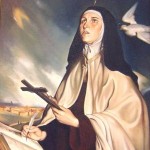 “St. Francis de Sales’ doctrine of divine love drew from the writings of three great women mystics of Italy and Spain:Catherine of Siena, Catherine of Genoa, and Teresa of Avila
“St. Francis de Sales’ doctrine of divine love drew from the writings of three great women mystics of Italy and Spain:Catherine of Siena, Catherine of Genoa, and Teresa of Avila
He sings of divine love, and we know that his voice reechoes the call of all God’s heralds even to our own day. However, the determining influence of the mystics of the Italian school does not make us forget the profound spiritual affinity which unites the holy Bishop to the blessed Mother Teresa. The message that the virgin of Avila addresses to us from the depths of Catholic Spain is substantially the same as we have already studied.
In the Treatise of the Love of God no spiritual author is so often named as St. Teresa; all of whose principal works are cited by Francis. Frequently in his letters he recommends reading her.
Furthermore, is it not significant to see how in the preface of the Treatise, St. Francis de Sales detaches her name from all those authors whose authority he invokes, as if to give more weight to her testimony;after indicating his sources, he adds:Lastly, the Blessed Teresa of Jesus has written so well of the sacred movements of charity in all the books that she has left us that we are amazed to see so much eloquence amid such great humility and such firmness of mind in such great simplicity. Her most learned ignorance causes the knowledge of many learned men to seem like ignorance, for after their great efforts at study they are put to shame by not understanding what she has written in so happy a way in the practice of holy love.
We discover at the same time in these lines what conquered St. Francis de Sales in the teaching of Mother Teresa; it is the combination of profundity and simplicity! He so often condemns in his letters the complication of all these “very obscure books which progress along the summit of mountains.”
Source: William Marceau, The Influence of Italian and Spanish Mystics on St Francis de Sales
http://web1.desales.edu/assets/salesian/library/Marceau-Mystics.pdf